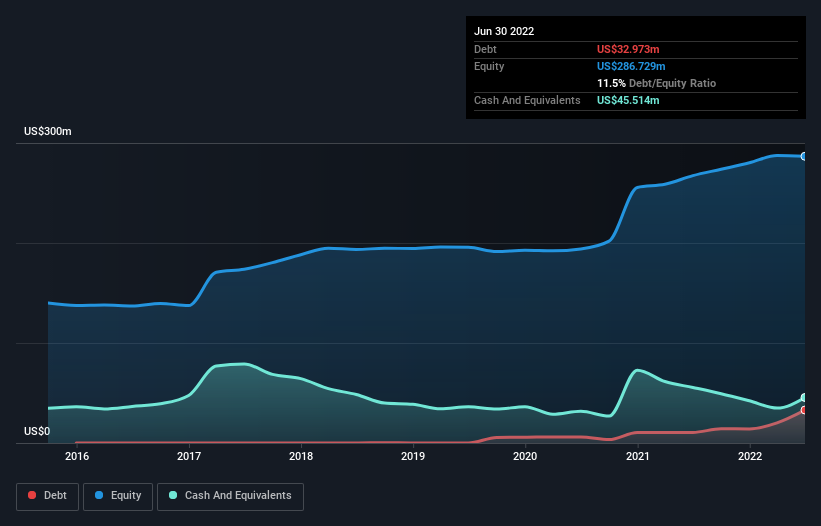Warren Buffett famously said, 'Volatility is far from synonymous with risk.' So it seems the smart money knows that debt - which is usually involved in bankruptcies - is a very important factor, when you assess how risky a company is. Importantly, AXT, Inc. (NASDAQ:AXTI) does carry debt. But the real question is whether this debt is making the company risky.
Why Does Debt Bring Risk?
Debt assists a business until the business has trouble paying it off, either with new capital or with free cash flow. If things get really bad, the lenders can take control of the business. However, a more frequent (but still costly) occurrence is where a company must issue shares at bargain-basement prices, permanently diluting shareholders, just to shore up its balance sheet. Of course, the upside of debt is that it often represents cheap capital, especially when it replaces dilution in a company with the ability to reinvest at high rates of return. When we think about a company's use of debt, we first look at cash and debt together.
View our latest analysis for AXT
How Much Debt Does AXT Carry?
The image below, which you can click on for greater detail, shows that at June 2022 AXT had debt of US$33.0m, up from US$10.5m in one year. But it also has US$45.5m in cash to offset that, meaning it has US$12.5m net cash.

A Look At AXT's Liabilities
We can see from the most recent balance sheet that AXT had liabilities of US$70.9m falling due within a year, and liabilities of US$3.67m due beyond that. Offsetting this, it had US$45.5m in cash and US$38.8m in receivables that were due within 12 months. So it actually has US$9.73m more liquid assets than total liabilities.
This short term liquidity is a sign that AXT could probably pay off its debt with ease, as its balance sheet is far from stretched. Succinctly put, AXT boasts net cash, so it's fair to say it does not have a heavy debt load!
Also positive, AXT grew its EBIT by 25% in the last year, and that should make it easier to pay down debt, going forward. There's no doubt that we learn most about debt from the balance sheet. But ultimately the future profitability of the business will decide if AXT can strengthen its balance sheet over time. So if you want to see what the professionals think, you might find this free report on analyst profit forecasts to be interesting.
But our final consideration is also important, because a company cannot pay debt with paper profits; it needs cold hard cash. AXT may have net cash on the balance sheet, but it is still interesting to look at how well the business converts its earnings before interest and tax (EBIT) to free cash flow, because that will influence both its need for, and its capacity to manage debt. During the last two years, AXT burned a lot of cash. While that may be a result of expenditure for growth, it does make the debt far more risky.
Summing Up
While it is always sensible to investigate a company's debt, in this case AXT has US$12.5m in net cash and a decent-looking balance sheet. And it impressed us with its EBIT growth of 25% over the last year. So we are not troubled with AXT's debt use. There's no doubt that we learn most about debt from the balance sheet. However, not all investment risk resides within the balance sheet - far from it. For example - AXT has 1 warning sign we think you should be aware of.
When all is said and done, sometimes its easier to focus on companies that don't even need debt. Readers can access a list of growth stocks with zero net debt 100% free, right now.
New: Manage All Your Stock Portfolios in One Place
We've created the ultimate portfolio companion for stock investors, and it's free.
• Connect an unlimited number of Portfolios and see your total in one currency
• Be alerted to new Warning Signs or Risks via email or mobile
• Track the Fair Value of your stocks
Have feedback on this article? Concerned about the content? Get in touch with us directly. Alternatively, email editorial-team (at) simplywallst.com.
This article by Simply Wall St is general in nature. We provide commentary based on historical data and analyst forecasts only using an unbiased methodology and our articles are not intended to be financial advice. It does not constitute a recommendation to buy or sell any stock, and does not take account of your objectives, or your financial situation. We aim to bring you long-term focused analysis driven by fundamental data. Note that our analysis may not factor in the latest price-sensitive company announcements or qualitative material. Simply Wall St has no position in any stocks mentioned.
About NasdaqGS:AXTI
AXT
Designs, develops, manufactures, and distributes compound and single element semiconductor substrates.
Mediocre balance sheet and overvalued.
Similar Companies
Market Insights
Community Narratives




